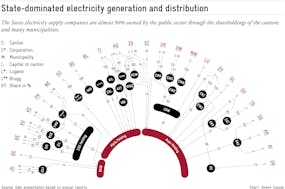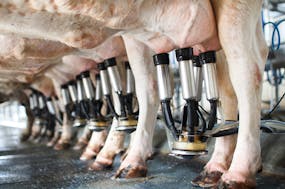Bern’s decision on 26 May 2021 to abort seven years of talks with Brussels on a new framework agreement covering relations with the European Union came as a single hammer blow. But the splinters will only gradually be revealed.
The rupture meant the intricate web of agreements between the two sides were frozen. No longer will the 120 odd bilateral deals that give Switzerland virtually all the advantages of full EU Single Market membership be updated, meaning the benefit to Swiss exporters will gradually decline. Likewise, Switzerland will no longer be included automatically in the EU’s assorted new projects, having already been excluded from some already in force.
To track this gradual divorce, Avenir Suisse has launched an ‘Erosion Monitor’. Published three times a year, the guide will keep detailed track of how Switzerland will be hurt by the impasse, in areas from the minutiae of technical trade arrangements to participation in major international schemes such as the EU’s Horizon scientific research programme.
Keeping tabs
Regular monitoring makes sense. Only by keeping tabs on the erosion of Switzerland’s advantageous relationship with the EU will it be possible to remind people about the short-sightedness of opposition to the framework agreement. While hostility spanned everything from the alleged losses of sovereignty to claims an automatic updating mechanism was unnecessary, Switzerland’s fundamental dependence on the EU was often overlooked.
The first Monitor illustrates the damage already done. Exclusion from Horizon means renowned Swiss research bodies, such as the two federal institutes of technology, will face major restrictions in their eligibility for EU grants. Over time, that could prompt a decline in quality and prove a disincentive for top scientists to be based in Zurich or Lausanne. Reports already suggest some top scientists are being tempted away.
More technically, the failure to keep updating trade rules for specific products to meet the latest EU requirements will present a growing barrier to Swiss exporters. The biggest initial impact has been seen in medical instruments and technology, with the EU no longer recognizing Swiss certification standards for new products. While that is far from an overall export ban, it means Swiss manufacturers selling into the EU will have to re-register and re-certify future goods for sale in EU markets, adding costs and complexity and potentially eroding competitiveness. In 2020, almost half Swiss exports of such medtech products went to the EU, illustrating the scale of the problem.

Switzerland’s bilateral relationship with the EU is slowly but surely beginning to crumble. (Rory McKeever, Unsplash)
Much more at stake
Agriculture is another bugbear. Regular alterations to EU rules, for example on animal care and protection, will leave Switzerland increasingly isolated. Tests formerly conducted by EU authorities on products destined for Switzerland will now have to be done domestically.
Education is another area set to suffer. Switzerland has traditionally conducted thousands of school and student exchanges with its neighbours – notably those countries with which the confederation has a common language. Over decades, the EU’s established Erasmus scheme has deepened understanding between participants. Switzerland, which had never participated fully in the scheme, will now be treated as another ‘third country.’
Media and culture have also taken a knock. Switzerland’s participation in the EU’s ‘Creative Europe’ programme was blocked soon after talks to join started in 2014 because of the subsequent referendum vote against the free movement of people. Potential EU subsidies had to be replaced by Swiss grants. Although participation talks eventually restarted, progress is now unlikely.
Avenir Suisse’s new publication includes a list of future areas under threat because of Bern’s rejection of the framework deal. In time, those in the ‘future’ category will move into the ‘already eroded’ division as the relationship deteriorates progressively.
How to go forward
What is to be done? The think tank argues a sustainable Swiss European policy should be based on five steps. The essential first is to create greater clarity and popular consensus on Switzerland’s understanding of its own sovereignty: Secondly, the bilateral approach pursued by Bern ever since 1992, when Swiss voters declined participation in the European Economic Area – a sort of halfway house to full EU membership – should be strengthened and energized through a ‘Bilaterals Plus’ package.
Third, Switzerland’s political parties must be focused on the commonalities of European policy. Fourth, the domestic market should be opened further, and remaining customs duties abolished. And finally, Switzerland (rather like Britain after Brexit) needs to develop and expand its foreign trade opportunities beyond the EU single market.





